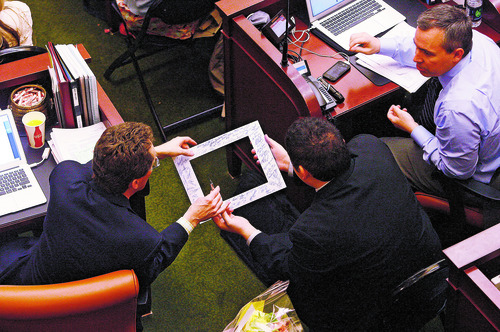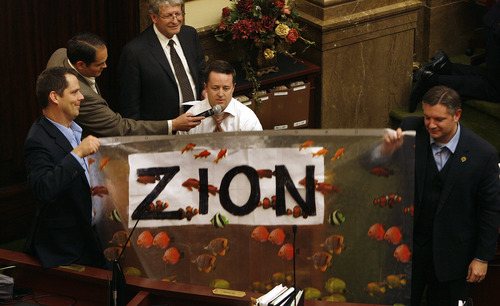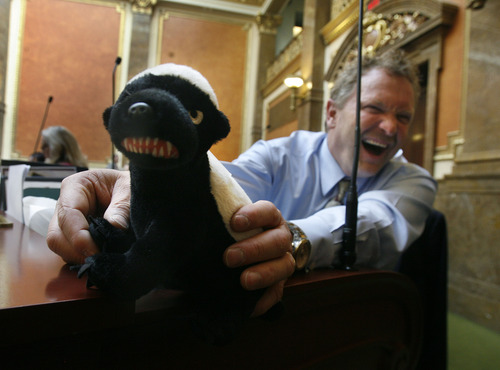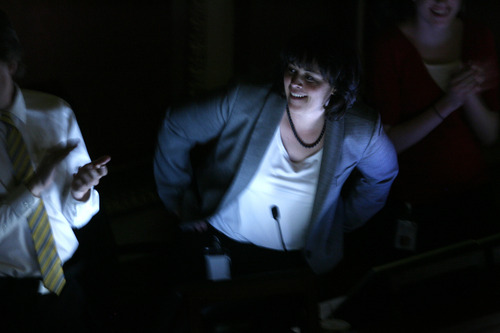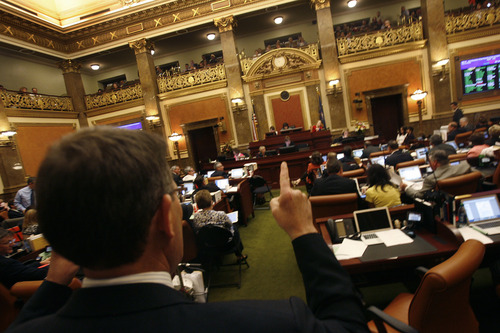This is an archived article that was published on sltrib.com in 2013, and information in the article may be outdated. It is provided only for personal research purposes and may not be reprinted.
Coming out of years of penny pinching and belt-tightening, the 2013 session of the Utah Legislature provided an opportunity to hit the reset button.
"Obviously, we have had the ability to have a little longer-term view," said Gov. Gary Herbert, serving his first full term as governor. "I think it's kind of a new beginning."
That translated into a larger increase in per-pupil funding than the state has seen in years, investment in an ambitious new science education program, a focus on relocating the Utah State Prison and freeing up the land where it sits, and how to deal with impending changes to Utah's health care system.
But the focus on the workaday issues, however, led to fewer battles and trench warfare than in past years, leading to what some called a bland, uneventful 45 days.
"This session has been much more subdued," said Sen. Curt Bramble, R-Provo, who is in his 13th session. "We haven't had the emotionally charged blow-ups we've had in the past, either on the budget or on policy discussions."
The passion and fire of some sessions, even on the most controversial of issues, simply wasn't there. Contentious bills died quietly in back rooms, were watered down or negotiated away.
At times it seemed to have a Session of The Living Dead feel.
House Speaker Becky Lockhart, R-Provo, said the lack of fireworks speaks well to the Legislature.
"I've thought a lot about that, if boring was the right word to use. It's not boring. For those of us who are weirdos, who love this stuff, it's not boring," she said. "In terms of having the big controversial scandals … sorry, we couldn't provide that this year."
The 2012 election ushered in 20 new House members and four new senators, with several of the most conservative and outspoken legislators losing their seats and creating something of an identity crisis.
Holly Richardson, a former state representative who followed the session closely, said that new blood increased the power of those who knew how to work the system. And it gave the session something of a "rudderless" feel, with leaders unable to keep the new members on task.
Education • Lawmakers increased the nation's last-in-the-nation per-pupil spending by 2 percent and covered 13,500 new students who are expected to enroll in public schools.
All told, Herbert said, the Legislature steered nearly $300 million in new money to education, the most it has seen since before the economy crashed.
The Legislature initiated a process to study and begin the first steps toward moving the Utah State Prison, which has stood on 690 acres in Draper for nearly 60 years. Proponents argue it would be an economic development bonanza, generating 40,000 jobs and $20 billion in economic development — figures opponents doubt.
In the last days of the session, the debate between the House and Senate hinged on whether a new prison, if it was built, should be run by a private company.
"I think you always consider privatization and if the private sector can do it better, then let's hire them," Herbert said. "That said, I'm a little more reluctant. I don't know if we want to have people incarcerated to the lowest bidder."
The Legislature again voiced its consternation with what it viewed as overreach by the federal government — whether it was on public lands issues, financial instability, or health care — but, perhaps not as loudly as it did in the past.
Conservative Republicans took a hard-line stand against taking more federal money to expand Medicaid, covering 131,000 low-income Utahns, but eventually backed down, agreeing to dialogue and data gathering.
Gay rights • Advocates for the gay, lesbian, bisexual and transgender community celebrated a significant victory, when their statewide bill to prohibit housing or employment discrimination based on sexual orientation or gender identity made it out of a Senate committee for the first time in years of trying.
"It's all p.r. now. It has nothing to do with policy anymore. All of the arguments are anecdotal, feel-good, warm-and-fuzzy things," said Paul Mero, president of the Sutherland Institute, but he acknowledges that "the other side is winning incrementally."
Mero said the LGBT community is celebrating, not going to the prom, but "having someone look at them." He said it was a move by Senate leadership to "let pressure out of the cooker" and not a true victory.
Among the reasons for the mellow tone, Bramble said, was because there was a cloud over the Capitol due to the ethics scandal and ongoing federal investigation into the conduct of Attorney General John Swallow.
Swallow • Because of questions raised about Swallow's conduct, Bramble said, legislators were more conscientious of their behavior.
Indeed, the session opened with discussion of whether lawmakers would have to impeach the attorney general, who at that point had been on the job for just a few weeks. Legislative attorneys were asked to prepare a memo outlining the process that would be followed.
By the end of the session, that talk had faded, but several bills had made their way through the Legislature to address gaps in state law spotlighted by Swallow's situation.
Legislators prohibited the type of outside consulting that Swallow was doing, without knowledge of Attorney General Mark Shurtleff. Another bill creates an ethics commission to investigate complaints against the state's elected officials — the governor, lieutenant governor, attorney general, auditor and treasurer — an entity that did not exist before.
And Late in the session, lawmakers rushed through a change that would allow the appointment of a special counsel to investigate election law complaints against the attorney general, rather than turning them over to the attorney general, himself.
"I think it has made us far more sensitive to conflicts. You haven't seen the fights, people trying to steamroll special interests through," Bramble said. "I think there's been a conscious move to be more statesmanlike."
If there was a topic that created a crossfire, it was attempts to liberalize Utah's already permissive gun laws — with bills doing away with Utah's concealed-weapons permit system for residents and another that initially would have allowed the arrest of federal law enforcement officers that try to enforce new federal gun laws.
The latter bill was watered down and the former is awaiting action by Herbert, who has expressed reservations about it.
"President Obama has probably been the biggest guns and ammunition salesman in America," said Sen. Lyle Hillyard, R-Logan, who says the bills brought to the Legislature were a reaction to the threat of federal erosion of gun rights.
Rep. Tim Cosgrove, D-Murray, also called the bills reactionary, and said what is really needed is "a serious discussion about guns," asking if Utahns want people carrying guns "in trolley square or temple square."
"Do we want to live in a world where everyone is carrying a gun?" Cosgrove asked.


